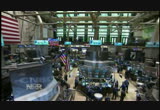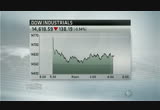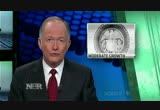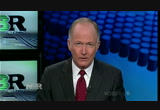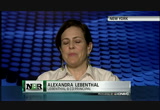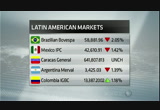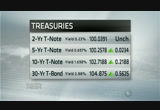tv Nightly Business Report PBS April 18, 2013 1:00am-1:30am PDT
1:00 am
>> reporter: it was another whip saw day that started ugly right off the bat. the problem is that key commodities like copper, aluminum and nickel were again dropping at essentially 52-week lows, all on concerns about slowing global growth. key commodities hit 52-week lows as well. and while commodity stocks like materials and energy suffered, there were also notable decline in industrials and in financials like bank of america which missed earnings estimates. and in technology stocks, tech bell whether apple hit a new 52-week low on concerns whether slowing iphone and ipad sales. the market stays a modest midday whether word being made in the boston marathon investigation and, again, moved down toward the close. >> the problem for the stock market is a simple one.
1:01 am
the market has been in an uptrend all year. now we've had two big down days, two days for selling on heavy volume. that's a question whether there is still an uptrend in the market. trend followers are an important part of the market. if they determine there's no more upside to the market, the uptrend could become a downtrend. for "the nightly business report," the new york stock exchange. >> the federal reserve remains steady and upbeat. moderate growth in all 12 of its banking regions over the past 6 weeks with the overall economy getting a big boost from housing and strong auto sales. the central bank also said the economy performed better during march and week's jobs report and the dip in retail sales would indicate. >> but that report didn't do much to boost confidence today. the market had created confusion
1:02 am
for investors. do i say the source? sell or is now a good time to buy? the head of global research is managing half a trillion dollars in retirement assets. this is a very confusing and nerve racking time for investors trying to navigate through all of this. how do investors sort through all of this information? >> we're dealing with a lot of noise right now. just this week, we're dealing with a lot of volatility. we had to deal with a decline in oil prices and earnings have started out quite rockly. so what we're trying to do is look through some of this noise and find stocks that can do well for the long run. an example of that are companies tied to the housing market such as realogy. they're going to do well as
1:03 am
housing prices and transactions continue to do well. >> so you're always looking for the mega-trends. you're looking at the long term, overall picture. you feel housing is recovering. what about energy? do you think the prices are generally headed higher or lower? >> well, commodity prices are suffering right now. and a lot of it has to do with some of the problems that china is having. they're also dealing with inflation bubbling up. so we're focusing more now on companies that have their own levers to pull. one company we like a lot is time warner. this company is doing really well because they own great brands, such as hbo, which has game of thrills, which is a great show. and they also have a great movie franchise with "the hobbit" franchise coming out, the first movie doing over a billion dollars at the box office. >> i understand you're not a real fan of technology, but when investors see these headlines about tech stocks are really hammered or the news today that bill was reporting on apple that
1:04 am
the stock is trading really low now, around the $400 range. how do you advise investors to examine and digest this information? >> the technology companies are struggling right now because companies are reluctant to spend money on tech nol right now. there's new structural trends going on such as cloud computing. we're looking at companies such as amazon that services business and can dominate the retail area. >> you look globally. where, besides the u.s., do you like? i mean, japan has been very aggressive with their monetary policy this year. and they'vea stellar performer overall. i keep hearing about mexico. a lot of money is going to mexico. where do you like right now? >> we're looking for their global industry. for example, you can go to europe and look at the pharmaceutical companies. pharmaceutical companies in
1:05 am
general have great pipelines. navartis has a great product outlook. their products are already approved by the f.d.a. so it takes away a lot of the risk. >> do you like them because they're a european-based industry? >> we like them because they're in the right globe industry. >> is there some trend out there that investors are missing out on? >> we think investors should be paying attention to two powerful trends going on in the equity markets that shoul support. stock correlations are declining. we're moving to a stock picker's market. you can do your homework, find the companies that are mispriced. the second is equity inflows have turned positive. this is after five years of fairly negative inflows. and that's another data point that will support the stock market. >> and a big guessing game right now is when the fed will start to gradually pull back on all of the liquidity it's been adding to this market.
1:06 am
when do you think that will be? >> we're watching jobs to figure that out. the payroll numbers are weaker in march. we think as long as the jobless rate remain up at 7.5, 8% range, the fed will continue to implement qe3. >> thanks for coming by. really appreciate it. >> well, some of the growth sited today is being attributed to the federal policy we were just talking about. and while those record-low rates may be beneficial to some, they may be hurting others. bank of america became some of the highlighting in a low-rate environment. sf servicing more loans and making less money from them. a report card for the good and the bad of the fed's low rates! the housing market, especially mortgage borrowers, have been the biggest beneficiary that began in 2008.
1:07 am
close to 20 million mortgages have been refinanced since then. mortgage applications were up about 5% last week and the mortgage banker's association says the purchase index is at its highest level in two years. >> homes are just incredibly affordable because of these very low rate that is have been there to push down interest rates. >> low interest rates are getting consumers into auto-showrooms. new car sales could top $15 million this year and negotia negotiating monthly payments that take away much of the new car sticker shock. both consumers and businesses are paying off or refinancing debt. consumer refinancing is at its lowest level in a decade. approximately $70,000 per household.
1:08 am
>> we've seen corporations clean up their balance sheets even more so. they've taken on a lot of cash to cushion themselves, in case anything bad were to happen going forward. >> the biggest downside, savers have been penalized. >> many savers, especially the elderly, has found that the interest that they used to live on is now falling short of paying their expenses. >> while a policy punishes savers, fed chairman says that's the trade-off for a stronger, overall economy. that's the nightly business report, washington. >> what happens next is crucial for bond investors. a top official warn that is investors holding municipal bonds could see armageddon if interest rates spike. the sec's don gallagher also says that more high profile bankruptcies like the ones in stockton and san bernandino california are adding this to the bond market.
1:09 am
he's concerned that individual bond owners could be wiped out as rates rise and bonds sell off. >> let's talk more about this. joining us now to give her perspective on the bond market and how you should position your portfolio, alexander levanthal with us. alexander, always good to see you. >> it's good to see you, too, bill. i realize that you were my first television interview 20 years ago. >> yes, back when we were both in middle school. i'm sure. >> yes. >> let me ask you, there are a lot of assumptions about this. the one that stuck out to me is we will see a spike in interest rates at some point as the fed begins to draw its liquidity. do you believe that's what's going to happen? >> no, and there are a few things that i do believe have some concerns about that report. one, the term armageddon gives me great pause. second, the idea investors would be wiped out gives me
1:10 am
great pause. and, third, the idea that investors would see the immediate spike in interest rates. it actually just goes back to your previous guest that says look, we're not necessarily easing the policy immediately because we're still not seeing the activity from jobs, the economy, show that the economy is heating up. >> right. >> so what should investors do? on one hand, you always hear you can't time the market. so should investors start unwinding out of these bonds? or is there still time to hold off? >> well, let's put your municipal bonds into a few different categories. first of all, most investors invest in investment grade and high-grade municipal bonds. those aren't the bonds that you're hearing about in california cities or some of the rhode island cities that have had some issues around them. so i would not be concerned as
1:11 am
an investor about significant declines in value because of credit quality. then you have investors who are investing through mutual funds. now, that's where you do want to have some concerns and think about your strategy when interest rates do go up. because what will happen at that point is that individuals will start redeeming their mutual funds. the -- manager of the mutual fund will start having to sell bonds in order to meet the redemptions. the more redemptions that happen, the more bonds the mutual fund manager will have to sell. and it sort of becomes the self fulfilling prophesy the snowball that will build up. remember, in mutual funds, you have no maturity. that's where investors could see their value go down precipitously. >> so are you holding funds as opposed to the individual bonds
1:12 am
themselves? >> i would argue for investors to be holding either individual bonds or if they have enough money to be investing in separately managed accounts. where they have a portfolio manager that manages their account directly in bonds and buys and sells bonlds according to what their needs are. also, different from mutual funds are etf where the manager doesn't have the cash dilemma that a mutual fund manager does. but one of the things that you want to do with your portfolio if you're managing it yourself or if you do have a portfolio manager, look to manage it defensively. by that, either have a ladder portfolio so you can reinvest as rates go up, or, have a short duration where you have -- >> okay. >> set et et cetera to keep your maturity short. >> i want to squeeze in a tax question. we hear that the obama administration may want to put a
1:13 am
cap on the tax exemption. is that another reason to clean up your portfolio now rather than wait? >> well, i don't know that it's another reason to clean up your portfolio, but it's certainly something to keep on the radar screen. you know, obviously, with everything that's going on in washington, everything is on the table. and with each one that comes out, there's a proposal that there would be a 28% cap on deductions so no one would be lower than the 28% tax bracket. that means you couldn't have all tax-free income that would put you in no tax bracket. in essence, that would be a tax on municipal bonds. mayors and governors are fighting this very, very aggressively. and each time they seem to get it out of the budget proposal and then a new budget proposal comes out and it's back in. i do believe that ultimately, state and local governments will be success chl in arguing that
1:14 am
this will drive the economy right back into the recession and actually won't solve the greater purpose of helping the economy. >> always good to see you, you young whipper snapper you. >> you, too. don't look a day older. >>. >> and coming up a little later in the program, one media company to watch this earnings season. first, let's look at how the international markets closed today.
1:15 am
we begin our market focus with earnings after the bell tonight. american express reported increased earnings per share up 7% from a year ago. that was better than analyst estimates. revenues also gained by 4%, but they were below expectations. shares had been down before the close, losing 46 cent on the day and then dropped further in after-hours trading. e-bay also missed on the revenue while beating expectations on the profit. but e-bay's guidance for the current quarter was below what analysts had been expecting. e-bay lost more during the trading day and then declined further on the cautious guida e guidance. >> strong earnings from matel today thanks to increased demand for dolls. not just barbie, but american girl, monster high and disney princess.
1:16 am
matel's shares rose almost 2%. also reported better-than-expected, an increased demand for its nutritional and diagnostic products. the shares gained 2.a% to $37. the stock has jumped more than 18% this year. >> moegs of the blue chips were down, but johnson&johnson gained as a jury found them not liable. j&j ended the day up more than half a percent. >> well, as earning season picks up, some big media and entertainment companies report their results next week. and those reports will reveal to wall street how hollywood studios are reaching more con summers, especially in their living rooms. julia borsten tells us about
1:17 am
trends in tv production and tv watchers from netflix. >> one media company to watch is netflix. the fourth quarter was a big one. not only did it launch its first original show, but its stock price has nearly doubled. those still down from its july 2011 peek of more than $300. >> the reality is they've made tremendous strides over the last 18 months restoring their brand. >> the stock gained unvailing the incidents all at once. it seems to have paid off with critical acclaim and buzz. there's some analysts that are skeptical saying the life of house and cards won't have a long-term impact. others say the crucial rules to secure net with the user base. >> i think it's very important for netflix to get to that point
1:18 am
where people forget about cancelling because they feel like there's something always unique and interesting coming. netflix has made the shift from being a tribute tor to more of a programmer. head-to-head with hbo for customers as well as content. more of the key components to watch in the earnings report is subscriptions. netflix forecast it will add slightly more than the 1.7 million subscribers it added in the year ago quarter. netflicks is evaluating several new markets. wall street is eager to hear where it will launch next. amazon which is investing more in originals and distribution rights. monday afternoon, the
1:19 am
company says it expects profiting from domestic screening to surpass that from dvd ds. we'll see if netflix beats expectations as we did last quarter. >> tomorrow, we focus on retail and the one key earnings report to watch in that sector. >> still ahead, the story of an art dealer and an f.b.i. raid. but, first, a look at the day's most actively traded stock and how commodities u treasuries and currency also faired.
1:20 am
a $6 milton tower trump apartment, the russian mob and illegal high stakes poker games that dealt in hollywood stars like leonardo dicaprio and tobey mcguire. what do they all have in common? a $100 million money laundering scheme and 30 arrests. bertha coonz ties it all together for us. >> as f. f.b.i. agents raided the building. federal authorities searched the 34-year-old owner with playing a leading role in a massive international gambling ring caterering to celebrities and wall street professionals. and a money-laundering
1:21 am
conspiracy that stretched from new york to kiev. prosecutors say the mob laundered millions in elicit profits through real estate including a 63rd floor apartment in truch tower. they were saddened to see the gallery implicated in criminal activity. but they know that it's not a member of the art dealer's association of america. he's not known for fostering and nurturing artists as many other dealers do. but rather for building a collection for more than a billion dollars actively buying and selling at major auctions. in london, last fall, he bought a warhol portrait for nearly $23 million. >> the gallery was closed today. but with the season set to begin in may, staffers put a sign in the window saying they will
1:22 am
reopen with an exhibition during the auction. but, before then, its owner will have to go before a judge for arraignment. >> and, finally, tonight, forbes magazine is out with its annual list of the biggest, most powerful and most valuable publicly held companies in the world. and topping the list, three banks. two of them are chinese. the industrial and commercial bank of china is number one. followed by the china construction bank. jp morgan, general electric and exxon mobile round out the top five. that last one, exxon, was tops in profits again netting about 45 billi$45 billion. some other interesting facts, walmart had the most sales. mortgage giant fannie may, the most assets. and ap 8 had the highest market value, at least for now. >> we've got a lot of earnings still to come here.
1:23 am
1:27 am
>> tonight, "quest" explores two very different types of earthquakes. first, the magnitude nine quake that devastated japan in march 2011 was a kind of earthquake called a megathrust quake. and one just like it could strike the west coast of the u.s. any day. >> its not a point source, it's a thousand kilometer long polygon so all of oregon, all of washington, northern california, will all be severely impacted. >> and, if you thought earthquakes were only random natural events, think again. >> it allows us to really say
1:28 am
"all right, human activity is causing the earthquakes." >> major funding for quest is provided by the national science foundation. and the corporation for public broadcasting. additional support is provided by -- the richard and rhoda goldman fund. the s.d. bechtel, jr. foundation. the dirk and charlene kabcenell foundation. the vadasz family foundation. and the wyncote foundation. support is also provided by --
1:29 am
>> when you live in earthquake country, preparing for the next big one is a part of life. but what happened in japan on march 11th, 2011, is a terrifying reminder that sometimes, all the preparation in the world still isn't enough. >>they were planning for a magnitude 8, you know maybe an 8.3, and they got a 9, 9.1 and it just overwhelmed their coastal defenses. people were washed off the tops of the three story buildings. >>the tohoku quake killed more than 15,000 people. it turned buildings to rubble -- leveled entire villages and triggered tsunamis nearly 50 feet high. bill steele is the coordinator for the pacific northwest seismograph network at the university of washington in seattle.
289 Views
IN COLLECTIONS
KQED (PBS) Television Archive
Television Archive  Television Archive News Search Service
Television Archive News Search Service 
Uploaded by TV Archive on

 Live Music Archive
Live Music Archive Librivox Free Audio
Librivox Free Audio Metropolitan Museum
Metropolitan Museum Cleveland Museum of Art
Cleveland Museum of Art Internet Arcade
Internet Arcade Console Living Room
Console Living Room Books to Borrow
Books to Borrow Open Library
Open Library TV News
TV News Understanding 9/11
Understanding 9/11